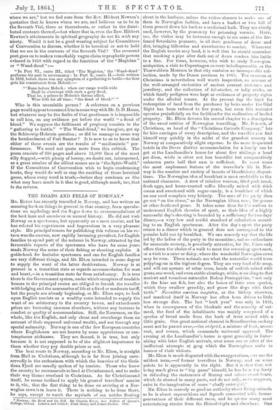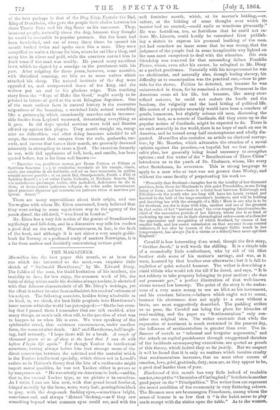THE ROADS AND FELLS OF NORWAY.*
MR. ELsost has recently travelled in Norway, and has written an amusing book on things in general in that country, frost specula- tions on mythology and the Sagas down to recommendations of the best inns and anecdotes on natural history. He did not visit Norway as a sportsman, but apparently as a mere tourist, and he has related his experiences and impressions in a very pleasant style. His principal reason for publishing this volume on his re- turn was the custom, now rapidly becoming prevalent, for English families to spend part of the autumn in Norway, attracted by the favourable reports of the sportsmen who have for some years made Norway the scene of their fishing or shooting exploits. A. guide-book for bachelor sportsmen and one for English families are very different things, and Mr. Elton intended in some degree to supply the want of the latter desideratum. Norway is at present in a transition state as regards accommodation for man and beast,—in a transition state far from satisfactory. It is true there is the Government system, under which occupiers of roadside houses in the principal routes are obliged to furnish the traveller with lodging and the necessaries of life at a fixed or moderate tariff, but the people are already beginning, as Mr. Elton says, to look upon English tourists as a wealthy caste intended to supply the want of au aristocracy in the country towns, and extortionate prices are becoming common elsewhere, without any increase in comfort or quality of accommodation. Still, the Norsemen, on the whole, like the English, and only cheat and overcharge them on account of their supposed universal wealth, and not through any special animosity. Norway is one of the few European countries where Englishmen are not known by some opprobrious or con- temptuous nickname. They are fleeced, it is true, but only because it is not supposed to be of the slightest importance to them whether they pay double prices or not.
The best route to Norway, according to Mr. Elton, is straight from Hull to Clnistiana, although he is far from joining unre- servedly in the enthusiasm with which the beauties of the Chris- tiana Fjord are usually spoken of by tourists. Those who know the country he recommends to land at Christiansand, and to make their way thence overland to Christiana. As for Christiansand itself, he seems inclined to apply his general travellers' maxim to it, viz., that the first thing to be done on arriving at a Nor- wegian town is to leave it. There is nothing to be done there, he says, except to watch the myriads of sea nettles floating
* Norway; the Road and the Fell. By Charles Elton, late Fellow of Queen's College, Oxford. Loudon and Oxford: John Henry and Janes Parker. 1861.
about in the harbour, unless the visitor chooses to make use of them in Norwegian fashion, and have a basket or two full of them poured down his back as a medicinal bath. They are chiefly used, however, by the peasantry for poisoning venni!). Here, too, the visitor may be fortunate enough to see some of the far- famed Seterdalen peasants, in all their gaudiness of dress and dirt, bringing bilberries and strawberries to market. Wherever the English tourist may land, it is well that he should remember that smoking a pipe after dark out of doors renders him liable to a fine. For those, however, who wish to study Norwegian antiquities, a visit to Copenhagen en route is indispensable, as the Thorwaldsen Museum in that city contains an incomparable col-
lection, made by the Danes previous to 1815. The museum at
Christiana is nevertheless well worth inspection, on account of the well-arranged curiosities of ancient peasant costumes and jewellery, and the collection of tal-stocker, or tally sticks, on which family pedigrees were kept as evidences of property-rights under the allodial tenure. At the present day the limit fos redemption of land from the purchaser by heirs under the Odal Right has been reduced to five years, but even this restraint operates prejudicially on the facilities for the realization of landed property. Mr. Elton devotes his second chapter to a description of the usual routine of Norwegian travelling. Mr. Bennett, of Christiana, as head of the "Christiana Caricole Company," lets for hire carriages of every description, and the traveller can find himself very quickly in the midst of the grandest scenery in Norway at comparatively slight expense. In the more frequented hotels in the Dovre district accommodation for a family can be got at the Landhandler's house for about five shillings a head per diem, while in other not less beautiful but comparatively unknown parts half that sum is sufficient. In most cases the most unpleasant feature of the traveller's life in Nor- way is the number and variety of insects of' bloodthirsty disposi- tions. The Norwegian idea of breakfast is most creditable to the national character. A stew of reindeer venison, fried pink trout, fresh eggs, and home-roasted coffee liberally mixed with thick cream and sweetened with sugar-candy, is a breakfast of which
no one need complain very bitterly. The men of the pa; ty then go out " on the chase," as the Norwegian idiom run., for grouse
or other feathered game. It takes some time for tl:e natives to understand English theories of sport, as their idea of a highly successful day's shooting is bounded by a sufficiency for two days' dinner,—a very low and sordid standard of calculation accord- ing to an English sportsman. Alter the day's sport the party return to a dinner which in general does not correspond to the promise held out by breakfast. We can scarcely say that the life led by the ladies of the party in the meantime, unless enthusiasts for mountain scenery, is peculiarly attractive, for Mr. Elton only offers them the choice of a walk to meet the returning sportsmen, or a visit to a =ter or dairy, where the wonderful Norwegian cows may be seen. These animals are what the naturalist would term polyphagous in the highest degree. They are very fond of fir soup, and will eat sprouts of other trees, heads of codfish mixed with grass, sea-weed, and even stable clearings, while, accosding to that ancient and veracious naturalist Bishop Pontoppidan, "not only do the kine eat fish, but also the bones of their own species, which they swallow greedily, and gnaw like dogs with their teeth." Neoessitas omnium magistra, as the bishop observes, and mankind itself in Norway has often been driven to little less strange diet. The last "bark year" was only in 1815, when in consequence of the blockade and the scarcity of oat- meal, the food of the inhabitants was mainly composed of a species of bread made from the bark of trees mixed with a little grain. One great national element in Scandinavian cookery must not be passed over,—the rotlgrdtl, a mixture of fruit, arrow. root, and cream, which commands universal approval. The evening at the Landbandler's house is spent generally in frater- nizing with later English arrivals, over some one or other of the ineffectual attempts at grog which the Norwegians make in honour of their visitors.
Mr. Elton is much disgusted with the exaggerations,—to use the mildest term,—of former travellers in Norway, and on some
points he is apparently in the right. But it is clear that, not being much given to "big game" himself, he has ben to hasty in ridiculing the statements of Murray and oil:et-3 about bears, which dti abound in many parts, and do not only, as he supposes, exist in the imagination of some " chaffy recter.girl."
Mr. Elton is scarcely so good an authority about living animals as he is about superstitions and legends connected with former
generations of their different races, and he quotes many most entertaining stories from the Heimekringla and elsewhere. One
of the best perhaps is that of the Dog King, Eystein the Bad, King of Drontheini, who gave the people their choice between his slave Thorer Faze and his dog Saurr as his successor. They, innocent people, naturally chose the dog, because they thought he would he amenable to popular pressure. But the beast had been bewitched, and out of every three times he opened his mouth barked twice and spoke once like a man. They were compelled to make a throne for him, where he sat like a king, and array him in silver and gold, while the courtiers carried him in their arms if the road was muddy. He passed many excellent ]aws, which he signed by a smudge on the parchment with his paw. After reigning for three years, however, some enemies, with diabolical cunning, set him on to some wolves which attacked his sheep. The natural instincts of the dog were appealed to, and overpowered those of the king, and the wolves put an end to his glorious reign. This touching story from the "Saga of Hake the Good," ought surely to be printed in letters of gold at the next Islington dog-show. One of the most curious facts in natural history is the enormous
migrations of the lemming, a wretched little animal something like a guinea-pig, which occasionally marches out in innumer- able hordes from Lapland westward, devastating everything as it goes. In old days special services were held and litanies
offered up against this plague. They march straight on, recog- nize no difficulties, and after doing immense mischief to all crops, the remnant that escapes from the awls, goshawks, cat- owls, and ravens that harass their march, are generally drowned miserably in attempting to cross a fjord. The exorcism formerly in use, with full appliances of bell, book, and candle, has been quoted before, but is far from well known :—
" Exorcize yes, pestiferos mures, per Deum Patrem et Filium at Spiritum Sanctum (+). ut confestim recedatis ab his campis, vineis, aquis, nee amplins in eis habitatis, sod ad ea loca transeatis, in quibus nemini nocere possitis: et ex parte Dei, Omnipotentis, Patris + Filii at Spiritus Sancti ( +) at totius Curios Ccelestis, et Ecclesia3 Sancta) Doi, vos maledicens quocunque ieritis, sitis maledicti, deflcientes de die in diem, et decrescentes qufitenus reliquice de vobis nulhe inveniantur. Quod prcestare dignetur qui venturus est kulicare vivos at mortuos per ignem. Amen.'"
There are many superstitions about their origin, and one Norwegian with whom Mr. Elton conversed, firmly believed that they were owing in some mysterious way to the agency of the °ands djevel, the old devil, "who lived in London."
Mr. Elton has a very fair notion of the genius of Scandinavian mythology and folk-lore, and in a discursive way tells his readers a good deal on the subject. Discursiveness, in fact, is the fault of the book, and although it is not either a very ample guide- book for Norway or a profound study of matters Norwegian, it is a far from useless and decidedly entertaining tertium quid.































 Previous page
Previous page